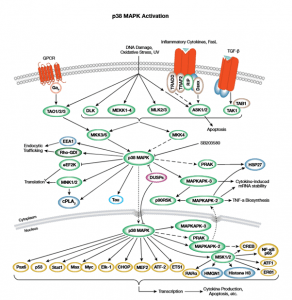Recently, scientists discovered a method to make chemotherapy more effective against metastatic breast cancer that has expanded to the bone. (Figure 1).

Figure 1: p38 MAPKs (α, β, γ, and δ) are members of the MAPK family that are activated by a variety of environmental stresses and inflammatory cytokines. As with other MAPK cascades, the membrane-proximal component is a MAPKKK, typically a MEKK or a mixed lineage kinase (MLK). The MAPKKK phosphorylates and activates MKK3/6, the p38 MAPK kinases. MKK3/6 can also be activated directly by ASK1, which is stimulated by apoptotic stimuli. p38 MAPK is involved in regulation of HSP27, MAPKAPK-2 (MK2), MAPKAPK-3 (MK3), and several transcription factors including ATF-2, Stat1, the Max/Myc complex, MEF-2, Elk-1, and indirectly CREB via activation of MSK1 (https://www.cellsignal.com/pathways/p38-mapk-signaling).
Unbelievably impervious to immunotherapy, one of the most cutting-edge and hopeful new cancer therapies, metastatic breast cancer has no known cure. The area around breast tumors that have metastasized to bone can be treated in this trial in order to make the tumors more susceptible to immune system assault. The immune cells called T cells and macrophages cooperated to clear metastatic breast tumors that had expanded to the bones of mice when the researchers increased their activity. These immune cells also continued to eradicate tumor cells that later reappeared.
Macrophages are myeloid immune cells that the body employs to fight off dangers like tumors or pathogens by attacking cancer cells. By instructing T cells on what they should be searching for, these macrophages further stimulate T cells and initiate the adaptive immune response. In this instance, these macrophages provide T cells with identifiable tumor antigens from deceased cancer cells, and the antigens control the T cells’ lethal processes.
They discovered that inhibiting a protein called p38MAPK changes the tumor microenvironment so that immune system components like immune cells and communication molecules called anti-tumor cytokines are more likely to fight it. Even though a p38MAPK inhibitor by itself decreased tumor growth, it did not completely eradicate the tumor. Two mouse models of human invasive breast cancer were examined by the experts.
Journal article: Stewart, S.A., et al., 2023. P38MAPKalpha stromal reprogramming sensitizes metastatic breast cancer to immunotherapy. Cancer Discovery.
Summary by Stefan Botha










